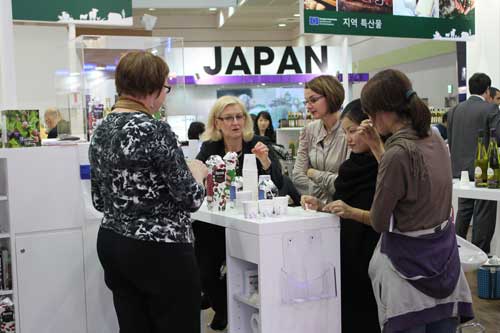South Korea is New Zealand’s sixth-largest export destination for food and beverage products. November’s Food Week Korea Expo in Seoul is an opportunity for Kiwi exporters to connect with this fast-growing market.
South Korea has a GDP of more than US$1 trillion and imports around 70 percent of its food and agricultural needs. The country’s food retail market alone is valued at more than US$50 billion and it was New Zealand’s sixth largest export destination for food and beverage products in 2011, with exports totalling US$553.53 million (NZTE Export Guide, April 2012).
With a population of 49 million and rising disposable incomes, South Korea is without doubt a significant market for foreign foods and beverages. Apart from the indispensable ‘kimchi’, a traditional Korean dish of fermented vegetables with seasonings found in every home kitchen, young, trendy and well-travelled Koreans now enjoy Western-style options such as crepes, pizzas, pastas and fried chicken, readily available in the many franchise outlets that have sprouted up across the major cities in recent years.
Like all shoppers, the Koreans also consider price, brand, quality and, in terms of food safety standards, the country of origin. They are just as discerning and willing to spend more when it comes to healthy foods, organic foods and beverages – all strong categories for New Zealand exporters.
While supermarkets and ‘hypermarkets’ have dominated the grocery retail sector in South Korea, sales generated through convenience stores and gas stations are expected to be the most lucrative for the food retail industry, with total revenues of US$29.9 billion in 2011, equivalent to 46.4 percent of the industry’s overall value (source: Market Research).
The Internet-based retail platform has also found favour with web-savvy and busy professionals – although the online sale of wines has yet to be approved by government.
Food Week Korea
Scheduled for November 6 to 9, Food Week Korea 2012 is aimed at facilitating connections between local and overseas businesses in the food and beverage sector.
At last year’s Food Week 674 one-on-one business meetings were arranged by the expo organisers, resulting in US$150 million worth of sales transactions. Exhibitors, especially foreign companies, will want to take advantage of this free service to meet Korean importers, wholesale and retail distributors, buyers from purchasing departments of hotels, restaurants and more.
The annual Food Week Korea is organised by COEX, a subsidiary of the Korea International Trade Association (KITA). The expo attracted 292 companies and 457 booths at its first show in 2006 and has been reaching new milestones with each event. Food Week 2011 hosted 700 companies from 34 countries, including the biggest co-ordinated European Union and ASEAN pavilions in the history of Korea’s food exhibitions.
The 1st Asia Food Forum, held in conjunction with the exhibition also attracted 12 CEOs and 150 other key players from the region’s food industry.
One thousand companies from 34 nations are expected to showcase from 2000 booths at the November 2012 show, with 33,000 trade buyers in attendance.
Food Week is held at the COEX venue in downtown Seoul. The host venue of the G20 World Summit in 2010, it features excellent hotels and retail outlets within its complex.
For more information on participating in Food Week Korea contact Linda Gurney, New Zealand representative at [email protected].




